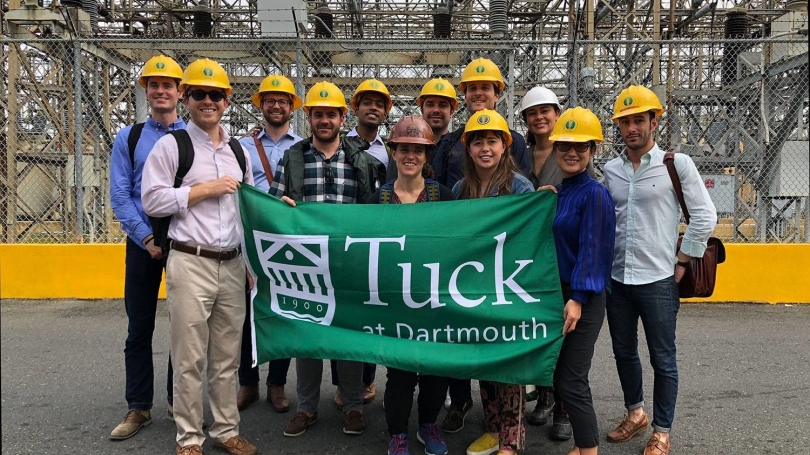
- About
- Education
- Research
- Engagement & Collaboration
- News & Events
Back to Top Nav
Back to Top Nav
Back to Top Nav
Back to Top Nav
At the second DEC lunch of the spring term, participants learned from Tuck Revers Fellows Kevin Griffith, Mathew O'Sullivan, and Vengatesh Muralidharan about the recent energy crisis in Puerto Rico.
At the second DEC lunch of the spring term, participants learned from Tuck Revers Fellows Kevin Griffith, Mathew O'Sullivan, and Vengatesh Muralidharan about the recent energy crisis in Puerto Rico. The three fellows were among a group of ten Tuck students and two Revers Center staff who travelled to Puerto Rico in November 2018 to see first hand how Hurricane Maria had impacted the island's electrical grid and to learn about ways the island might improve upon its current energy infrastructure.
While in Puerto Rico, the fellows visited power plants operated by the state-owned Puerto Rico Electric Power Authority (PREPA) and privately-owned AES and EcoEléctrica. Kevin, Mathew, and Vengatesh observed the need for PREPA's assets to undergo significant upgrades in comparison to the privately-owned power plants. Yet since Hurricane Maria, PREPA has faced significant barriers to implementing these upgrades: the utility has lost 50% of its employees due to funding issues, which are exacerbated by the ~10% decline in energy demand on the island following the hurricane. PREPA has also suffered from significant leadership turnover in the past year, with five different people filling the role of CEO over the past 18 months. Considering PREPA's current challenges, participants were curious to know about opportunities for transformation, such as renewable energy or energy privatization.
Hurricane Maria certainly highlighted the need for more resilient energy sources such as renewable energy; however, only 2% of Puerto Rico's energy currently comes from renewables. The Revers Fellows expressed surprise at the lack of renewables on the island, particularly given the amount of media coverage that renewable energy providers have received for their work in Puerto Rico since Hurricane Maria. "When we were setting up meetings in Puerto Rico," the fellows noted, "we thought we would be meeting with solar companies or with Tesla, but these companies had limited presence there. We realized that these companies might not play the role we thought they did on the island".
Renewable energy faces three real challenges in Puerto Rico. First, the regulatory approval process is extremely slow (substantial operational bottlenecks impede the process to approve net-metered renewables, for example). Second, there is a cap on how much solar energy can be directed to the grid by generators and be paid for under Puerto Rico's current net metering legislation. Third, it will be difficult for renewable energy to compete with coal and oil: the generation infrastructure for these fossil fuels is already in place, and these energy sources are very cheap.
Though the fellows were not overwhelming optimistic about Puerto Rico transitioning to renewable energy, they were hopeful about the island's prospect of energy privatization.
According to the speakers, energy privatization is moving forward in Puerto Rico. Banks are currently advising PREPA on what energy privatization would look like: it's likely that PREPA will still own its current transmission and distribution (T&D) infrastructure, but that the system would be managed by an outside source under a concession. Privatization might allow for the inflow of capital into Puerto Rico's energy system, which could be used to upgrade the island's current energy infrastructure and improve the energy transmission network. PREPA's T&D infrastructure – more than power generation – was the most significant obstacle to restoring power to the island following Hurricane Maria.
By sharing salient anecdotes and important factual information, the Tuck Revers Fellows painted a vivid picture of the challenges to Puerto Rico's energy system and the opportunities the island might have to improve upon the status quo. The lingering question that remains amongst attendees of the talk was when will the island's energy system revolutionize and will it be soon enough to avoid another energy disaster?